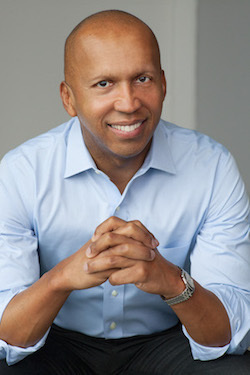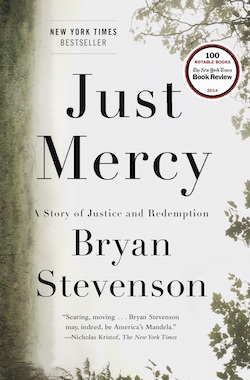Go Big Read selects ‘Just Mercy’ for 2015-16
Archbishop Desmond Tutu calls Bryan Stevenson “America’s Mandela.”
Stevenson has spent his career fighting for racial justice and wants his fellow Americans to realize that something is inherently wrong with the land of the free and the home of the brave having the highest incarceration rate in the world.

Bryan Stevenson
Photo: Nina Subin
In the 1980s, Stevenson co-founded the nonprofit Equal Justice Initiative, based in Montgomery, Alabama. Since then, he has argued before the U.S. Supreme Court five times and played a role in landmark court cases that have transformed how the criminal justice system deals with violent youths. His book, “Just Mercy: A Story of Justice and Redemption” is the latest selection for Go Big Read, UW–Madison’s common-reading program.
Go Big Read organizers encouraged the campus community to suggest titles that fit into a theme of inequality in America. Chancellor Rebecca Blank chose “Just Mercy” from the short list that a selection committee culled from 200 nominated titles.
“Bryan Stevenson’s book raises tough and important questions about inequalities in the criminal justice system,” Blank says. “Now is a particularly good time to hold these conversations, as UW-Madison students, staff and faculty grapple with the ways in which these larger national issues affect our own community.”
Hundreds of UW students and community members have taken part in demonstrations following the fatal shooting by a Madison police officer of a black teenager on the city’s East Side, as well as grand jury decisions in Ferguson, Missouri, and New York. Many more added their voices to this important discussion during campus forums.
Stevenson’s book focuses on one of his first cases, which involved Walter McMillan, a black Alabama businessman sentenced to die for the murder of a white woman despite having an alibi verified by dozens of witnesses. “The message of this book, hammered home by dramatic examples of one man’s refusal to sit quietly and countenance horror, is that evil can be overcome, a difference can be made,” said a review in The New York Times. “‘Just Mercy’ will make you upset and it will make you hopeful.”

Stevenson grew up in Delaware and graduated from Harvard in 1985 with a law degree and a master’s degree in public policy. Since then he has helped secure relief for dozens of condemned prisoners, advocated for poor people and developed community-based reform litigation aimed at improving the administration of criminal justice. He also is on the faculty at New York University School of Law and the winner of a MacArthur “genius grant.” Last year President Barack Obama appointed him to a task force established to recommend police practices that can improve relations between officers and the people they serve, particularly in minority communities. And he was named today (April 16) as one of Time magazine’s 100 Most Influential People.
William P. Jones, a professor of history and a member of the Go Big Read review committee, says he will use Stevenson’s book in his courses to introduce the question of “mass incarceration” and its impact on the economic and political history of the United States.
“There is perhaps no greater evidence of injustice and inequality in our society than the brutality, unfairness and racial bias displayed by our criminal justice system,” Jones says. “‘Just Mercy’ is an ideal book for us to read and discuss together as we seek to understand and address those problems.”
By recounting his experience as a defense attorney, the author shows how poverty and racial bias work together to shape those inequalities, Jones says. “Stevenson forces us to confront the contradictions between our criminal justice system and our nation’s founding principles of equality, freedom and justice.”
Planning is underway for how students, faculty and staff will use the book in classrooms and for special events associated with “Just Mercy.” Stevenson is scheduled to visit campus Oct. 26, when he will give a talk in Varsity Hall at Union South. Copies of the book will be given to first-year students at the Chancellor’s Convocation for New Students and to students using the book in their classes.
UW-Madison instructors interested in using the book can request a review copy here.
Tags: books, diversity, Go Big Read, law, UW-Madison Police




